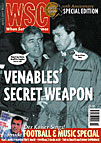 Rogan Taylor pays tribute to former Liverpool manager Bob Paisley, who died last month
Rogan Taylor pays tribute to former Liverpool manager Bob Paisley, who died last month
Football in Britain owes much to its coal-mining communities, especially those in the North-East of England and in Scotland. Never mind the great players hewn out of them for generations; forget the loyalty and tenacity of the football crowds they helped produce. Just think of the managers who were born in sight of the pit-shafts: Busby, Shankly, Stein and Paisley amongst them.
These men brought something to their management of football clubs – and their relationships with players and supporters – that reflected some of the moral values and sense of solidarity common to people in the mining towns and villages of their birth. They were all hard men, too, as tough as the old boots they played in before becoming the most successful managers in the game.
None were tougher or more successful than Bob Paisley. There’s no need even to rehearse the list of silverware he mined in a mere nine seasons as Liverpool’s manager. He spent fifty years at the Club after signing as a player in 1939, and any footballer lucky enough to arrive at Anfield co-incidentally with his appointment as manager (like Phil Neal) ended up with more medals than he could ever wear.
And Paisley was tough – as a player and manager. His only FA Cup success in either role came in the Amateur version, with Bishop Auckland, in the season he joined Liverpool. The Club allowed him to play on through the competition which was just as well, as Auckland ended up with such a fixture congestion that they played their last 13 matches in 14 days, including the Wembley Final which they won 3-0 after extra time.
During the war, stationed at first near Tarporley, Cheshire, he still turned out at Anfield, cycling thirty miles on one occasion before appearing in the Liverpool Senior Cup Final against Everton. On August Bank Holiday, 1941, he left for Egypt, but the first letter sent on to him in Cairo was an instruction from Liverpool’s manager, George Kay, to report for the first game of the season at Preston.
Four years in the desert and riding tanks up Italy during its liberation left a profound distrust of almost anything ‘foreign’. During the days of Liverpool’s every-seasonal jaunts in Europe many years later, Paisley was more paranoid than most about what especially the Communist Bloc clubs might get up to. Players weren’t allowed to drink the tea provided (“It’s bloody drugged, man”), or indeed anything else the Liverpool party had not specifically brought along with them. On one famous occasion, Paisley leapt across two tables in a restaurant abroad to prevent reserve goalkeeper Ogrizovic from sullying his lips with a milk-shake. “Do you think you’re on holiday, man?”
He wasn’t the greatest of communicators either, and players were often none the wiser about who was playing after Bob had read the team sheet out. He was forgetful of names – hence his own nick-name ‘Dougie Doings’ – but he claimed that some of Shankly’s best one-liners were really his. Paisley just couldn’t deliver them like the maestro could.
But trophies he delivered like a regular postman, and the Club and its fans are eternally grateful. By repute, his bottle only went once, just before the UEFA Cup Semi-Final in Barcelona, 1976, nervously fumbling his words in the pre-match talk, he informed the hushed audience that “the left-back, he’s not very fast, but he’s quick”. We could say much the same about Bob Paisley himself.
From WSC 110 April 1996. What was happening this month